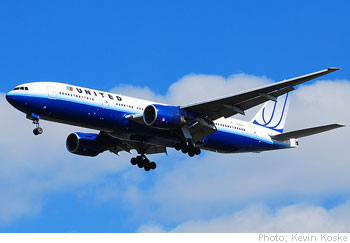 Today I had quite an experience with United Airlines (UAUA). It has very little to do with much of anything I usually write about here, save one key element: I have posited that to succeed in what I’ve been calling the Conversation Economy, companies must learn to have conversations with their customers at scale. (And to do so, they will need to leverage open platforms like Twitter, Facebook, etc. and, of course, change the way they instrument their business. But more on that later).
Today I had quite an experience with United Airlines (UAUA). It has very little to do with much of anything I usually write about here, save one key element: I have posited that to succeed in what I’ve been calling the Conversation Economy, companies must learn to have conversations with their customers at scale. (And to do so, they will need to leverage open platforms like Twitter, Facebook, etc. and, of course, change the way they instrument their business. But more on that later).
Well, here’s a tale of one company failing miserably at doing just that, even while, in the end, due to my own insistence (and most likely, the rising level of anger in my voice), it kind of, sort of, managed to not totally fail.
But first, the backstory.
I am a United flyer, in the main. I’m not saying I’m a proud, loyal, or passionate United flyer, but a United flyer I am. I like their “PS” service between NY and SF, and I fly that route a lot – to the point of knowing the flight attendants and picking exactly which seats I settle into each trip. I tend to fly United where ever else I go (and anyone who follows me on Twitter knows I go to a lot of places). I’ve been an Executive Premier there for a long, long time (though I think it dropped at some point during the bad years of 2001-02) – which means I fly a ton with United. At some point or other this year, in fact, a gate agent at United let me know that I’m a million mile flyer – however, most of their agents on the phone have no idea what I’m talking about when I recite this nugget back to them.
Anyway, this is a long way of saying, I know the airline really, really well. And when I fly, even with my family, I tend to fly with United, even though I’ve had my share of travel and customer service disasters (and you all know, regardless of what airline you fly, what I mean by that).
But does the airline know me? No. Not at all. And today was a remarkable example of that in action.
Read the whole thing at Searchblog »
- Bulenox: Get 45% to 91% OFF ... Use Discount Code: UNO
- Risk Our Money Not Yours | Get 50% to 90% OFF ... Use Discount Code: MMBVBKSM
Disclaimer: This page contains affiliate links. If you choose to make a purchase after clicking a link, we may receive a commission at no additional cost to you. Thank you for your support!


Leave a Reply